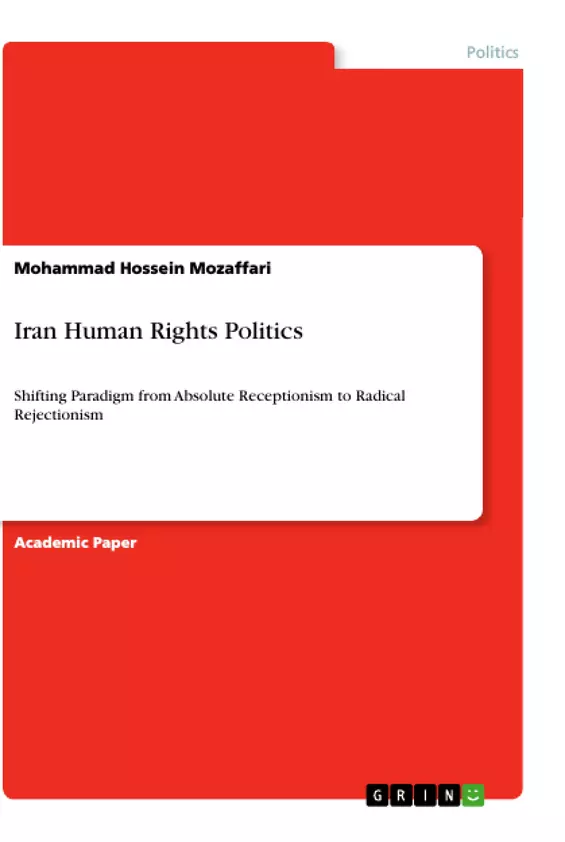This paper seeks to examine the complicated aspects of Iranian human rights politics in various periods and to explore the Iran exceptionalism in human rights discourse in the light of competing paradigms from receptionism to rejectionism. The first part of the paper deals with the Iran human rights policy from the lens of receptionism, while the second part of the paper discusses the rejectionist policy which was adopted following the Islamic Revolution. The third part shall focus on the paradigm shift to reservationism in the course of second and third decades after the Islamic Revolution. Then, the next paradigm shift resulting from the dichotomy is scrutinized in view of the political changes in the country. Finally, the paper concludes that the paradoxical Iranian policies towards human rights might be explained through understanding the specific characteristics of the legal system of Iran.
Inhaltsverzeichnis (Table of Contents)
- Introduction
- Absolute Receptionism
- Radical Rejectionism
- Paradigm Shift to Reservationism
- Conclusion
Zielsetzung und Themenschwerpunkte (Objectives and Key Themes)
This paper examines the complicated aspects of Iranian human rights politics in various periods and explores the Iran exceptionalism in human rights discourse. The paper analyzes the shifting paradigms of Iranian human rights policy, from absolute receptionism to radical rejectionism, and then to reservationism, highlighting the reasons behind these contrasting positions.
- Iran's human rights policy in different historical periods
- The interplay of receptionism, rejectionism, and reservationism in shaping Iranian human rights discourse
- The influence of the Islamic Revolution on Iran's human rights stance
- The role of the Shah regime and the post-revolution government in shaping human rights policies
- The specific characteristics of the Iranian legal system and its impact on human rights policies
Zusammenfassung der Kapitel (Chapter Summaries)
- Introduction: This section introduces the paper's focus on Iranian human rights politics and its evolving paradigms. It highlights Iran's shift from supporting the UDHR to challenging its universality following the Islamic Revolution.
- Absolute Receptionism: This chapter analyzes the Shah regime's efforts to gain international recognition by adopting a receptionism policy towards human rights. It discusses the regime's attempts to portray itself as a champion of human rights while simultaneously suppressing dissent and employing torture.
- Radical Rejectionism: This chapter examines Iran's human rights policy during the first decade after the Islamic Revolution, characterized by a rejectionist approach. It highlights Iran's questioning of the legitimacy of human rights standards and calls for revisions to the UDHR.
Schlüsselwörter (Keywords)
The key terms and focus topics of this paper include Iran, Muslim states, Islamic revolution, Islamic human rights, Universal Declaration of Human Rights, receptionism, rejectionism, reservationism, and the Iranian legal system.
Frequently Asked Questions
What is "Iran Exceptionalism" in the context of human rights?
It refers to the unique way Iran navigates human rights discourse, often contrasting international universal standards with specific Islamic legal and cultural interpretations.
How did the Islamic Revolution change Iran's human rights policy?
The revolution led to a shift from "absolute receptionism" (under the Shah) to "radical rejectionism," where the universality of the UDHR was openly challenged.
What does the term "Reservationism" mean in this study?
Reservationism describes a paradigm where international human rights are accepted only with specific reservations that align them with Islamic principles and domestic laws.
Was the Shah regime truly supportive of human rights?
While the Shah adopted a policy of receptionism for international recognition, the regime simultaneously suppressed dissent and employed torture, creating a paradoxical situation.
How does the Iranian legal system influence its human rights stance?
The specific characteristics of the Iranian legal system, rooted in religious law, often dictate the boundaries and applications of human rights within the country.
- Quote paper
- Mohammad Hossein Mozaffari (Author), 2017, Iran Human Rights Politics, Munich, GRIN Verlag, https://www.grin.com/document/1021465



